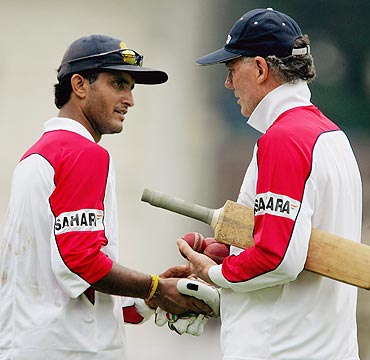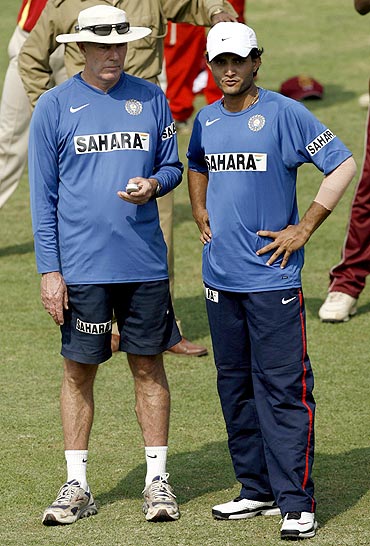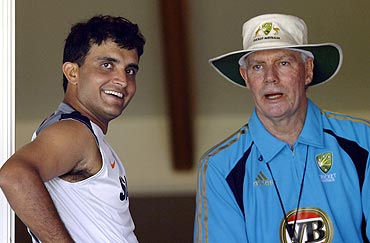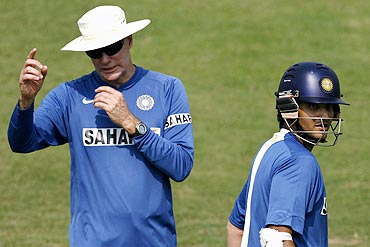 | « Back to article | Print this article |
Chappell spills beans on bitter relationship with Ganguly
Former India coach Greg Chappell has revealed details of the tumultuous relationship he shared with former captain Sourav Ganguly.
In his autobiography Fierce Focus Chappel says the only player for whom he has only admiration is current skipper Mahendra Singh Dhoni. The Australian feels Dhoni broke down a "hierarchical" system in the team by becoming the voice of young players.
Chappell, whose two year stint from 2005 to 2007 was marred by several controversies including the infamous public spat with then skipper Ganguly, recalls how Dhoni rose in stature in the side.
Writing in his autobiography Fierce Focus, Chappell said such was hierarchy in the team that youngsters were petrified of speaking before a senior such as Sachin Tendulkar at team meetings.
"The real ray of hope for Indian team was Mahendra Singh Dhoni, one of the most impressive young cricketers I'd ever worked with. He was smart, and able to read the game as perceptively as the best leaders," Chappell wrote.
'Dhoni became my go to man'
"If I wanted to know what was going on in the middle, Dhoni became my go to man. He would eventually breakdown one of the biggest problems in the India teams," he added, referring to the young players' reluctance to express themselves.
"...the youngster would say, 'I can't speak before so-and-so. If I speak up before a senior player, they will hold it against me forever.' Some were petrified, flat out refusing to say a word in a meeting before, say, Tendulkar had spoken. It was so hierarchical, it made Australian teams look like commune," he wrote.
Chappell said he began to separate team meetings into three groups -- senior, intermediate and junior -- so that he could hear their thoughts, which were later broken down by Dhoni as he gained in confidence and asserted his leadership.
Dhoni made his Test debut after Chappell took over as coach.
Recalling his tumultuous sting with India, Chappell said at times he had to deal with mood swings, fluctuating commitment to fitness and senior players' unwillingness to get out and mix with the local culture and enjoy tours.
'His idea was probably 'you scratch my back, I scratch yours'
Chappell also delved on his stormy relationship with Ganguly.
Speaking about the unhappy relationship, Chappell said although Ganguly's support was one reason why he got the job with the Indian team, it turned bitter when the then skipper started expecting him to be his saviour.
"His idea was probably 'you scratch my back, I scratch yours'," Chappell wrote.
"He expected I would be so grateful to him for getting me the job that I'd become his henchman in his battle to remain captain. I, on the other hand, took on a job with the primary responsibility to Indian cricket and the Indian people.
"There were a billion of them and only one of Sourav. I wanted to help India become the best cricket team in the world," he said.
"If that means eventually they could only become that team without Sourav, then so be it,"
'He was caught with self doubt and his own struggle to survive'
Chappell said, adding that on field, "there was no bigger panicker than Sourav."
He described Ganguly as a player "caught with self doubt and his own struggle to survive".
"Sourav had great batting and leadership talent, but never realised his potential because he was consumed by what he saw as the threats around him," he wrote.
Chappell claimed that when he was asked to frankly give his views to the BCCI on the team's future, he told the Board president Ranbir Singh Mahendra that "I couldn't see this team winning the 2007 World Cup, but regeneration was possible if it started with Sourav permanently handing the captaincy to Rahul."
"I thought once Sourav is no longer in charge, his batting would improve and his followers might be brought into line and made better contributors to the team," Chappell wrote.
"Sourav was reappointed for the coming tour of Zimbabwe, after which he sent me a very hurt text message asking why I wasn't backing his captaincy," he said.
Chappell said he had no bitterness for Ganguly at that time.
"I did like Sourav," he wrote.
'He wanted a political ally'
Chappell blamed Ganguly's attitude problem to the cultural upbringing, which he said was common in India.
"I felt strongly that if he gave up the captaincy, he could find a way to batting greatness. He didn't want a coach, or an agent of change. He wanted a political ally," Chappell said.
On the team's trip to Zimbabwe, Chappell described how the daily results affected the moods of players and accused Ganguly of confusing them with constant changes.
"When I sat down and talked with him about it, he would agree to everything I asked, but then go his own way. Some other senior players were similarly expert at Gandhian passive resistance: saying 'Yes yes yes' before doing the exact opposite. Each time he agreed, then didn't do it," he wrote.
"In a warm up for the Tests, against Zimbabwe A at Mutare, Sourav went missing for the toss so I went out to do his duty for him. I lost. When he learnt what I'd done, he seemed more vexed that I'd lost than that the coach had had to do the captain's job," he said.
'He was simply frightened of a failure before the Test series'
During the match, Chappell also accused Ganguly of faking an injury and walking off after four overs.
"He was retiring hurt, yet he appeared to have no injury. I suggested he go for an MRI scan, but he declined. I'd seen a lot of excuses over my years from guys who didn't want to bat in difficult conditions, but normally they were more subtle than this," he wrote.
"He, in my view, was simply frightened of a failure before the Test series," he said.
Chappell recalled that when that when he inquired about Ganguly's actions from some of his teammates, they said it had been going on for some years.
"...joking that he had a miracle doctor in Kolkata, because his serious injuries always cleared up when he went home."
Ganguly told Chappell he'd do anything to come back in the team
Chappell revealed that during the 2006 South African series, Ganguly sent him a text message saying he felt like his 'son' and would do anything to come back into the team.
"As I wasn't a selector, that wasn't my decision, but it turned out that a deal had been done among the panel and he was picked as the 'all-rounder' for the Test series against Sri Lanka," he wrote.
Chappell said he feared that Ganguly's reinstatement would destabilise the new captain Rahul Dravid and jeopardize the improvement that the team had made.
"Sure enough, the very complicated ducks and drakes being played among the politicians and administrators resulted in Sourav's reinstatement as a player for our tour to Pakistan," he wrote.






